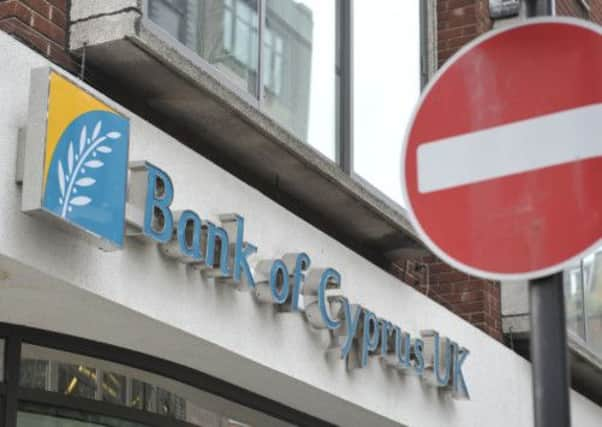Pensions ‘safe’ in Cyprus crisis


He told MPs the Government was putting pension payments on hold to “ensure that any payments made by Her Majesty’s Government to banks in Cyprus get to the intended recipient”.
He also confirmed earlier announcements that more than 3,000 British service personnel based in Cyprus would be compensated by the Government if the levy goes ahead to ensure they would not suffer “unreasonable losses”.
Advertisement
Hide AdAdvertisement
Hide AdCypriot government postponed a vote on the unprecedented one-off bank deposit tax, part of a wider bailout package, until today.
The island’s banks will remain closed until Thursday, as yesterday’s bank holiday has been extended by two days, the nation’s central bank said.
The Cypriot government wants time to amend the deal reached over the weekend, which will raid ordinary people’s savings to partly fund a bailout package.
Unlike the previous rescues for Greece, Portugal, Ireland, and Spanish banks, the proposed Cypriot bailout is the first one that dips into people’s bank accounts to finance a bailout.
Advertisement
Hide AdAdvertisement
Hide AdIn exchange for 10 billion euro (£8.6 billion) in rescue money, the government proposed a one-time tax of 6.75% on all bank deposits under 100,000 euro (£86,490) and 9.9% over that amount.
The bailout package, which has still to be finalised, involves the International Monetary Fund, European Central Bank and European Union.
But after prompting an outcry from depositors, the Cypriot government is now looking at changing the terms of the deal so small savers lose less, while big depositors pay more.
One proposal is to make the tax more progressive, with a one-time 3% levy on deposits below 100,000 euro, rising to 15% for those above 500,000 euro (£428,505).
Advertisement
Hide AdAdvertisement
Hide AdMr Clark reiterated the UK Government’s commitment to compensate around 3,000 armed forces members stationed in Cyprus for “reasonable losses” incurred from the situation.
And he said several thousand UK pensioners in Cyprus would have their payments temporarily frozen, adding that it is possible to change the designated bank account to receive payments online.
“Any UK pensioners in Cyprus can be assured that their future pension payments are being held safely and a normal payment service will resume as soon as the situation in Cyprus becomes clear,” he said.
“However, recipients of these payments are able of course to switch the bank account to which payments are made with immediate effect.”
Advertisement
Hide AdAdvertisement
Hide AdMr Clark urged anyone wishing to do so to contact the International Pension Centre online.
The “risky” bank deposit tax would be “extremely dangerous” for wider economic confidence, shadow Treasury minister Chris Leslie said.
“While it is, of course, important their banks are put on a secure footing, it is extremely dangerous for wider economic confidence if the fundamental trust of retail depositors is undermined in this way.
“This was a very risky decision and we would expect the British Government to caution against such a sequestering of the funds of ordinary bank customers.”
Advertisement
Hide AdAdvertisement
Hide AdAny modifications to the bank deposit levy will have to be approved by the other eurozone finance ministers, who will hold a telephone conference ahead of the Cypriot parliament vote.
Several hundred people gathered outside the Cypriot parliament building, with some chanting “thieves”.
Analysts have warned that the proposal sets a dangerous precedent, undermines confidence and could spark an exodus of capital from other fragile European economies and jeopardise the region’s recent tentative recovery.
Michael Hewson, senior analyst at CMC Markets, said: “If European policymakers were looking for a way to undermine the public trust that underpins the foundation of any banking system they could not have done a better job.
Advertisement
Hide AdAdvertisement
Hide Ad“Not only is it in complete contravention of the deposit insurance rules agreed by all EU countries in October 2008, and an absolute PR disaster, but it opens up a Pandora’s box of all possibilities with respect to precedent and future measures in other EU countries that find themselves having to ask for help in the future.”
Stock markets have so far proved reasonably resilient to the news with the FTSE 100 Index initially falling by 100 points yesterday, but closing 35 points down on 6457.9 - a fall of 0.5%.
The euro also fell sharply against the US dollar and the pound even though the Cypriot economy accounts for only 0.2% of the combined output of the 17 eurozone countries.
Cypriot banks got into trouble after losing some 4.5 billion euros (£3.8bn) on their Greek government bond holdings after eurozone leaders decided to write down Greece’s debt last year.
Advertisement
Hide AdAdvertisement
Hide AdPresident Nicos Anastasiades, who assumed the presidency on March 1, urged MPs to approve the tax.
During his campaign and after his election he had rejected the idea of going after bank deposits.
But with Cyprus’ banks eight times the size of the economy, the government would be unable to pay back the amount of loans it would need to rescue them.
The president has said since the tax was the “least painful” course of action and stressed that it would only happen once because it would ensure the bailout would not push the country’s debt to unsustainable levels.
Advertisement
Hide AdAdvertisement
Hide AdThe president said if he had not accepted the tax on bank deposits, the European Central Bank would have stopped providing emergency funds to the country’s top two lenders which would have led to the collapse of the banking system, the bankruptcy of thousands of small businesses, job losses, and ultimately the country’s exit from the euro.
Reports have suggested that eurozone leaders, particularly in Germany, insisted on the levy because of the large amount of Russian capital kept in Cypriot banks, amid fears of money-laundering.